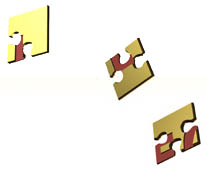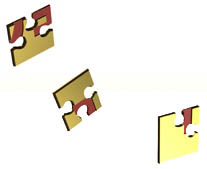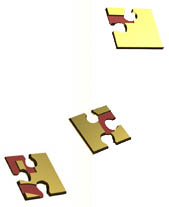| |
![]()
Vol. 71, No. 12,
December 1998
Defining the Role of Paralegals
Para-legal: an individual qualified through education
and training, employed or retained to perform substantive legal work and
supervised by a lawyer licensed to practice law in this state, requiring
a sufficient knowledge of legal concepts that, absent the paralegal, the
attorney would perform.
By Dianne Molvig
| What is the role of paralegals in the legal community? A State Bar task
force grapples with this complex issue, considering what skills paralegals
should possess, whether paralegals should be supervised and by whom, and
if they should be regulated and by what agency. But first the task force
had to define what is and is not a "paralegal." |
To many onlookers, it may have seemed a recipe for gridlock. Take a collection
of lawyers from diverse practice settings: large firms, small firms, corporate
legal departments, government offices, and legal services agencies. Add
several paralegals who hold conflicting views among themselves as to how
to improve the stature of their profession. Then mix everyone together to
create the State Bar's Paralegal Practice Task Force, asking it to examine
questions that have long stirred controversy among both attorneys and paralegals:
What is the role of paralegals in the legal profession? What qualifications
should they bring to the job? And what exactly is a paralegal anyway?
"If you'd have asked me three years ago if we had a chance of coming
up with solutions, I probably would have said, 'no, we don't have a prayer,'"
confesses Pam Barker, Milwaukee attorney and chair of the task force. That
feeling lingered, she notes, even after the group's first few meetings.
Clearing the air had to be an initial order of business.
"During the first year we spent a lot of time just in debate,"
she says. "We had to get comfortable in trusting each other because
this is such a controversial issue. And people hold very strong views and
have different perspectives."
 Barker's earlier doubts
have since given way to optimism. "For about the last year-and-a-half,"
she says, "we've been working very well together on moving things forward.
I think we're going to come out with an excellent work product. I've been
astounded by the amount of energy people have put into this - because
they believe in it. The lawyers believe in it. The paralegals believe in
it." Barker's earlier doubts
have since given way to optimism. "For about the last year-and-a-half,"
she says, "we've been working very well together on moving things forward.
I think we're going to come out with an excellent work product. I've been
astounded by the amount of energy people have put into this - because
they believe in it. The lawyers believe in it. The paralegals believe in
it."
The finished product, in the form of a final report to the State Bar's
Board of Governors, is still months away, as the task force has yet to resolve
several key issues. Task force members aren't kidding themselves, however;
they know that even after they've completed and submitted their report,
the debate over paralegals may rage on in the Bar for some time to come.
Meanwhile, many lawyers would rather not grapple with the paralegal issue
at all, preferring that it simply go away.
"The fact is we're going to need to deal with this in one fashion
or another," Barker contends. "We can do it the way we're doing
it now, which is to come up with what we think is the best of all worlds
for everybody. Or we can go back to where we were three years ago when paralegals
went to the Legislature to try to get (a licensing bill) passed on their
own. Then we'll be fighting this out on a political playing field rather
than working together through the State Bar to come up with solutions."
The push by paralegals for a licensing bill was one of two driving forces
that once again brought the topic of paralegals to the fore. The other factor
was a recommendation that came out of the State Bar's Commission on the
Delivery of Legal Services. In its 1996 report, the commission advised the
Bar to further study what role paralegals might play in meeting the legal
needs of the unserved among the general public. The Paralegal Practice Task
Force was a direct outgrowth of that recommendation.
First things first
Task force members soon realized that their first hurdle was to agree
on terminology. Currently, the word paralegal is tagged onto job descriptions
that may differ considerably from one law practice setting to another. Rather
than using the word paralegal, the American Bar Association prefers the
term legal assistant to describe the same sort of position. In some firms,
neither paralegals nor legal assistants exist, but someone on staff, perhaps
called a legal secretary, actually does paralegal work. To further cloud
the definition issue, there is what's come to be known as the legal technician,
highly suspect in legal circles, who carries out paralegal work without
any supervision from an attorney.
Although the ABA considers paralegal and legal assistant to be synonymous
terms, "several law firms now have both paralegals and legal assistants,
and they differentiate between the two," says Lynn Retzak, paralegal
program director at Lakeshore Technical College in Cleveland, Wis. "They'll
have paralegals, and then instead of legal secretaries, who don't like being
called that anymore, they'll have what they call legal assistants. You see
the confusion?"
 In an attempt to clear
up that confusion, a task force subcommittee, after much discussion and
debate, hammered out the following definition: In an attempt to clear
up that confusion, a task force subcommittee, after much discussion and
debate, hammered out the following definition:
"A 'paralegal' is an individual qualified through education and
training, employed or retained to perform substantive legal work and supervised
by a lawyer licensed to practice law in this state, requiring a sufficient
knowledge of legal concepts that, absent the paralegal, the attorney would
perform."
A footnote to the above clarifies that the definition assumes a "grandfather
clause" for work experience, which is not specifically addressed in
the definition itself. The grandfather clause, still not in final form as
of mid-October, will speak to the need to give paralegals out in the field,
who may not have had formal education and training, the credit they deserve
for working their way up through the ranks and learning on the job.
Applying the task force's definition to new people entering the field
is a much easier matter than figuring out how to bring existing paralegals
under the definition. That's made writing the grandfather clause something
of "a quagmire," points out Shawn Olley, a task force member and
owner of Milwaukee-based Midwest Paralegal Services, which offers freelance
paralegal services to attorneys. "It is difficult for us to come down
and say, 'this is what makes a paralegal,'" she explains, "because
there are so many different stories out there (among paralegals already
in practice). But we need to do that now, so that five or six years from
now, we don't have that problem anymore."
In addition to the definition, the other major piece completed by the
task force so far is a set of proposed ethics rules for paralegals. These
comprise a 16-page document that is based on SCR 20, the Wisconsin Supreme
Court ethics rule for attorneys. Portions of that rule were extracted and
adapted as appropriate. "We felt (SCR 20) would be a good starting
point to see what kinds of ethics rules should apply to paralegals,"
says Frank Remington, a state Department of Justice attorney and a member
of the task force's ethics subcommittee, "bearing in mind that we needed
to make modifications clearly reflecting the fact that paralegals are working
under the supervision of attorneys."
Fear of shingles
 The portion of the task
force's definition of paralegal that will jump out most to attorneys' eyes
consists of four words: supervised by a lawyer. That phrase is key to the
task force's approach, say members. "We are not working to create a
group of people who will compete with lawyers in the practice of law,"
emphasizes Remington, "but rather to create a system that reflects
what is really going on already. That is, paralegals are assisting lawyers
in the practice of law. Paralegals serve a function, but that function always
is carried out under the supervision of a lawyer." The portion of the task
force's definition of paralegal that will jump out most to attorneys' eyes
consists of four words: supervised by a lawyer. That phrase is key to the
task force's approach, say members. "We are not working to create a
group of people who will compete with lawyers in the practice of law,"
emphasizes Remington, "but rather to create a system that reflects
what is really going on already. That is, paralegals are assisting lawyers
in the practice of law. Paralegals serve a function, but that function always
is carried out under the supervision of a lawyer."
Paralegals on the task force echo Remington's words, even though they
historically have disagreed on various issues. Two professional organizations
represent the state's paralegals: the Madison Area Paralegal Association
and the Paralegal Association of Wisconsin, which has chapters in Milwaukee,
Madison, the Fox Valley, and Racine/Kenosha, plus an ad hoc chapter in Wausau.
The latter association is the one that pursued legislative action to license
paralegals in 1995, while the Madison Area Paralegal Association opposed
licensing on the grounds that, because it felt paralegals should always
work with attorney supervision, licensing was unnecessary.
But even with its pursuit of licensing, the Paralegal Association of
Wisconsin never sought to push for paralegals' independence from lawyers,
says John Goudie, the group's president. "Our intent was to formalize
the profession," Goudie says. "There are no formal standards of
practice for paralegals anywhere in the United States. And we felt it was
time they were needed." Goudie acknowledges, however, that the impression
persists among many in the legal community that his organization's legislative
goal was to win the right for paralegals to practice independently of lawyers
- an impression perhaps fostered by the fact that no one outside of
the Paralegal Association of Wisconsin actually saw the draft of the licensing
bill, which never was introduced in the Legislature.
Next Page
|
